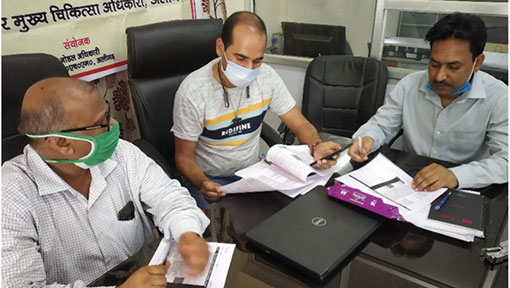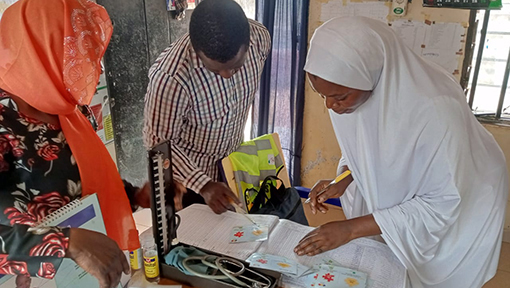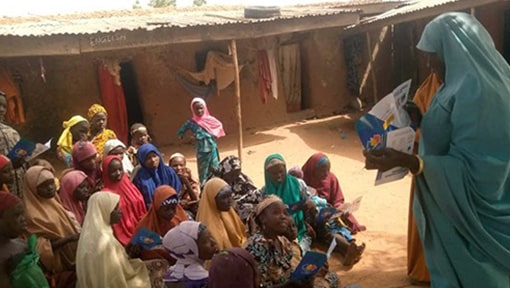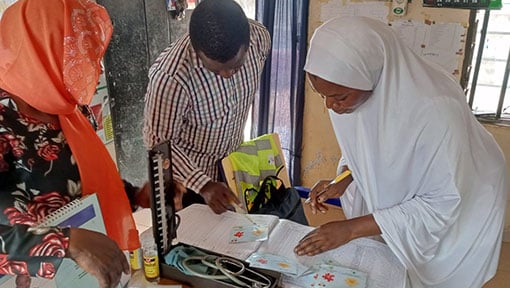RAISE Tool and Targeted Coaching Sets Aligarh on a Path of Self-Reliance
Contributors: Umam Farooq Khan, Samarendra Behera, Emily Das and Parul Saxena

Supreme Kumar Sagar (center) completing the RAISE tool along with the Urban and FP Nodal Officer and Urban Health Coordinator in Aligarh.
The Challenge Initiative’s (TCI’s) goal is to strengthen health systems by transferring capacity to local governments so family planning (FP) and adolescent and youth sexual and reproductive health (AYSRH) high-impact interventions sustain beyond a city’s engagement with TCI. TCI does this by using its coaching model to mentor city governments in scaling up proven best practices.
In India, TCI’s Reflection and Action to Improve Self-reliance and Effectiveness (RAISE) tool is used for self-evaluation, responsive feedback and course correction. RAISE uses a standard set of indicators that helps city governments systematically measure the intensity and effectiveness of their family planning and AYSRH interventions, gauge progress, and identify the components that need to be strengthened to increase impact and ensure sustainability. As a result, government officials – including Urban and FP Nodal Officers, Urban Health Coordinators, District Program Managers, District Community Process Managers, Medical Officers, the Family Planning Logistics Management Information System (FPLMIS) Managers, Data Account Assistants and other officials – participate in quarterly RAISE assessments.
The city team in Aligarh, Uttar Pradesh, has seen progress from its first round of RAISE to the latest round conducted in November 2021. Pleased at this progress, Supreme Kumar Sagar, Divisional Urban Consultant of Aligarh, shared what RAISE has meant to the city team and to its family planning program:
Prior to the RAISE tool, the Health Management Information System (HMIS) data was mainly used to review family planning indicators of the city. However, HMIS data does not record progress on processes as it is a quantitative system. It was in June 2020 that Aligarh team had received coaching from the TCI India team on the RAISE tool and its utility in assessing the progress of family planning program. Initially, I was zapped by this lengthy tool. Still, Aligarh conducted its first round of RAISE assessment in July 2020. With a bittersweet experience, we did the second, then third and eventually until the sixth round in November 2021. In each new round, we collectively assessed the results of the previous RAISE exercise. This helped us to reflect, identify gaps and look for solutions. As a team we noticed that we were able to gauge the progress we had made over processes.
He said after analyzing four rounds, they found that the scores for Domain 3 (i.e., institutionalization of TCI approaches at all the levels of the health system) and Domain 4 (i.e. sustained impact through improved attitudes and behaviors towards family planning) were stagnant at 67% and 63% respectively. Because Aligarh was in its pre-graduation stage, he said they knew that had to improve their scores across all four domains. Together with TCI’s India team, an action plan was developed that focused in particular on improving Domains 3 and 4. The plan included several steps:
- Coaching on the high impact approaches (HIAs) in each monthly meeting and FP review meeting
- Coaching officials on the use of TCI University
- Placing HIA infographics at appropriate places in government office and UPHC premises to remind staff about the steps involved in implementing HIAs
- Coaching of UPHC staff, Auxiliary Nurse Midwives (ANMs) and Accredited Social Health Activists (ASHAs) on the indenting process of FPLMIS
- Ensuring fixed day static service/Antral diwas is organized at each UPHC every week
- Organizing public-private interface meetings to sensitize accredited private facilities providers of Hausala Sajheedari on providing family planning services to urban poor and timely reporting data on HMIS
- Coaching ANMs and ASHAs on family planning counseling skills during their monthly meetings
- Using the mapping and listing HIA to identify unlisted slum populations, and then seeking resources to serve them and recruiting 25 new ASHAs
We also advanced this coaching to our peers in a TCI diffusion city, Kasganj. This included coaching our colleagues on the implementation of key HIAs and the 2BY2 matrix, utilizing urban health nutrition day’s (UHND) outreach sessions for motivating adolescents to avail benefits and services from facility adolescent health days.
As a result, the overall score for family planning improved in the last round of the RAISE assessment by 25% (90% in round 6 compared with 66% in round 1) which meant Aligarh was progressing towards maturity and self-reliance. Similarly, the scores of all four domains improved, with Domains 3 and 4 improving in round five and six. Aligarh graduated from TCI’s direct support in March 2022.

Aligarh’s overall family planning RAISE scores, tracking progress over six rounds.
Supreme Kumar Sagar concluded by saying:
The RAISE assessment has helped us in decision-making based on data and creating accountability among staff. The RAISE tool introduced by TCI India has helped us to better understand the progress of our city based on the additional indicators which play an important role in formulating systematic strategies for improving our family planning and AYSRH program.”






